
Freshfel Europe Headlines – Edition 1, 2022
Freshfel Europe’s Headlines publication provides an overview of the Association’s most recent activities.
For more information about Freshfel Europe’s activities please contact the Freshfel Europe Secretariat.

Freshfel Europe becomes member of Expert Group on the European Food Security Crisis Preparedness & Response Mechanism (EFSCM)
Earlier this year Freshfel Europe and ESSA (jointly) became a member of the new Expert Group on the European Food Security Crisis Preparedness and Response Mechanism of the European Commission. So far two meetings have taken place. The first meeting was scheduled on 9 March mainly to urgently address food supply concerns in relation to the war in Ukraine. At this meeting the Delegate General of Freshfel Europe Philippe Binard raised a number of concerns, especially highlighting the potential issue related to oversupply of fresh produce by countries which were used to export to Ukraine.
Following the emergency meeting on 9 March, the European Commission organised the first official stakeholder meeting on 23 March. First part of the meeting focused on procedural rules, work plan for 2022 and other arrangements related to the establishments of the Expert Group. The second part of the meeting provided a platform to further discuss issues arising from the war in Ukraine. Eglė Baecke, the Secretary General of ESSA and Director Food Quality at Freshfel Europe took the floor to welcome the efforts of the European Commission in supporting the agricultural industry. Freshfel Europe and ESSA stressed that the industry still does not have full data to assess how the Ukrainian crisis will affect the industry with regard to oversupply and that the European Commission should remain open for further support measures in the future. Freshfel Europe and ESSA also emphasised that while the European Commission’s priorities might lie on other aspects, they should continue working on market diversification to open new markets for Europe’s high-quality produce to compensate the volumes which were lost following Belarusian embargo in December 2021. On the same occasion Freshfel Europe and ESSA underlined concerns related to indoor production due to energy prices, transport issues, seasonal workers, changing production practices (planting schemes), increased risk for food fraud and security, among other concerns.

Freshfel Europe stresses logistical challenges arising from the Ukraine situation, Belarus & Russia in DG TAXUD Trade Contact Group Meeting
Freshfel Europe attended an ad-hoc emergency meeting of DG TAXUD’s Trade Contract Group on the 24 March 2022 to discuss together with stakeholders from the transport sector as well as other industries, the current key challenges for logistics, transport and custom operations affecting trade operations. For the fresh produce industry Russia has been a closed market since 2014, now followed by the embargo from Belarus and the situation in Ukraine, which is continuing to impact European export markets. Port congestions, because of shipping lines refusing to continue to ship to Russia are impacting the current trade operations for European exporters and importers. In conjunction with the lack of availability of feeder vessels and the overall scarcity of containers is not just creating delays with impact on quality of the good, but also increasing the costs for shipping significantly

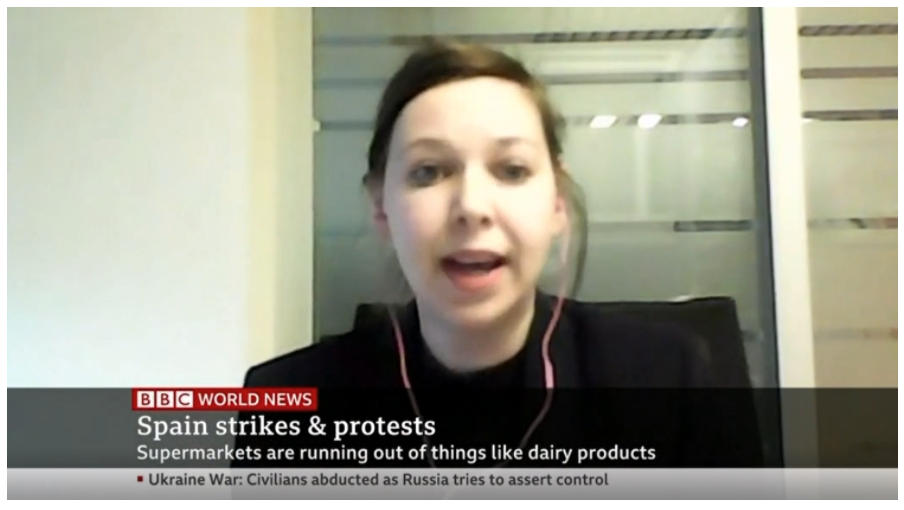
Freshfel Europe highlights global economic challenges for the fruit sector in BBC World interview
Freshfel Europe was invited to comment on the impact of the Spanish Truck Driver Strike by BBC World News in March. Freshfel Europe highlighted that the strike was a symptom of a broader economic problem, resulting from the cost challenges in the areas of logistics as well as input costs. As Spain is the largest supplier of fruit and vegetables in Europe, any supply disruptions in Spain will further impact supply chains across Europe as well. However, as the strike mainly affected independent truck drivers and heavy rains affecting harvesting operations, the impact was limited to domestic logistics and supplies. Nevertheless, Freshfel Europe underlined the vulnerability of fresh produce in this current economic situation and suggested to not only focus on regulatory action, but also to review the distribution of costs in the supply chain, the importance of educating consumer and sector responsibility to improve the products’ attractiveness overall for consumers.
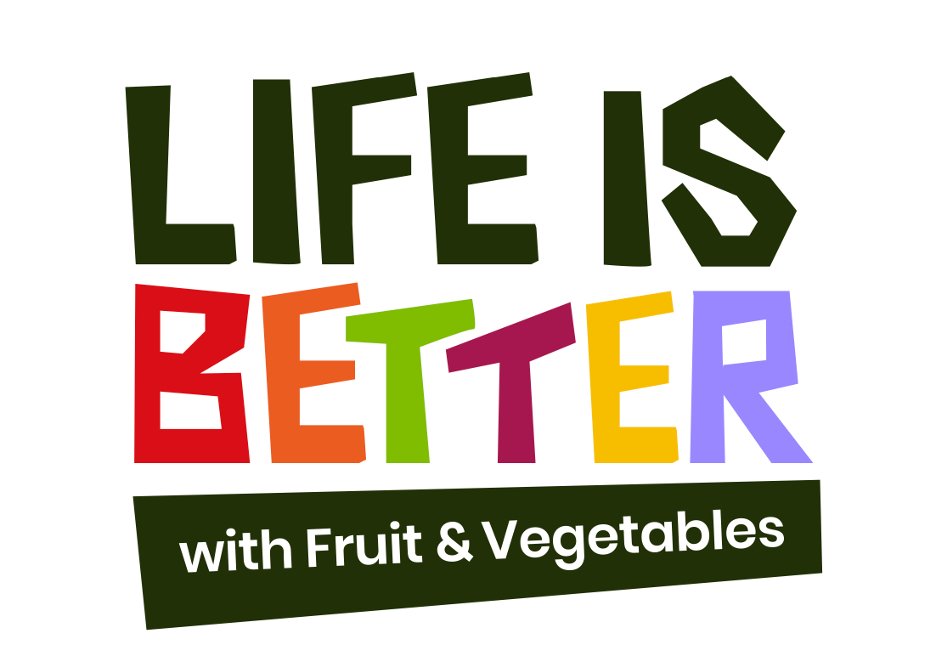
Freshfel Europe joins new EU-funded project to promote fruit & vegetable consumption among Millennials
After the successful end of the Follow me to be Healthy with Europe campaign, Freshfel Europe will continue to promote fruit and vegetable consumption among young Europeans by joining the project Life is Better with Fruit and Vegetables. The Life is Better with Fruit and Vegetables campaign is an EU-funded programme that targets Millennials and aims at increasing their level of knowledge regarding the nutritional benefits, versatility, sustainability, and practicality of fruit and vegetables. Young Europeans aged 25 to 35 represent a key demographics of consumers, as they are still shaping their purchasing and eating habits.
The campaign, which kicked off in March 2022 and will run until February 2025, will take place in France and Ireland, in addition to having a pan-European dimension. It is a joint effort between Interfel (Association Interprofessionnelle des Fruits et Legumes Frais) and AIB (Association Interprofessionnelle de la Banane) in France, Bord Bia in Ireland, and Freshfel Europe. Life is Better with Fruit and Vegetables will rely on a budget of approximately €5.4 million and a combination of press relations, website and social networks, advertising, communication tools, and events to maximize the outreach of its message.

Freshfel Europe Environmental Footprint Initiative underway
This year Freshfel Europe has begun work on its new project to develop a common sector environmental footprint methodology, database and digital tool in collaboration with Freshfel Europe members. The objective of the Freshfel Europe Environmental Footprint Initiative is to ensure the sector is fit for market and policy developments on environmental footprint, such as substantiating green claims and sustainability labelling, so that the sector is not left behind. Within the Initiative, Freshfel Europe will act as the sector body representative and platform for dialogue and action under the Chair of Freshfel Europe Director for Sustainability and Health Nicola Pisano. On the 9 March Freshfel Europe held a first meeting with its members to identify and agree on the founding principles of the Initiative. This was followed by a meeting with the European Commission DG ENVI Unit B.1 on Sustainable Production & Consumption and DG SANTE Unit E.1 on Food Information and Composition to understand EU developments on Product Environmental Footprint Category Rules (PEFCR) and legislative implications that could influence the trajectory of the Initiative’s methodological work. Freshfel Europe’s Environmental Footprint Initiative is open to all Freshfel Europe members. .

Freshfel Europe responds to consultation on application of EU health & environmental standards for imported agricultural & agri-food products
In February the European Commission launched a consultation on the application of EU health and environmental standards to imported agricultural and agri-food products. Health standards applicable to agri-food imports are mostly measures aimed at ensuring that food is safe for humans and to prevent the spread of pests or diseases among animals and plants. The EU already maintains a high level of human and plant health protection, including in the context of international trade in agri-food products. All products imported into the EU market must comply with its appropriate health standards. However, the French Presidency to the Council introduced an initiative on ‘mirror clause’ for imported goods, which has triggered further discussions on imported goods.
The core part of the consultation for the fresh produce industry related to environmental aspects, which will be taken into account when assessing applications for import tolerances for pesticides that are no longer authorised in the EU. Comments submitted by Freshfel Europe referred to another ongoing initiative on sustainability due diligence which aims to achieve the same results. The Association also listed its views on the principle of ‘mirror clause’ and sustainability targets overall and presented its views on imports of fresh produce from non-EU countries where different production conditions might imply that different plant protection solutions are needed. More about the consultation and public response can be found here.

Freshfel Europe responds to European Commission food labelling consultation
In December 2021 the European Commission launched the open public consultation for the proposal for a regulation on food labelling rules as part of the revision of Regulation (EU) No 1169/2011 on the provision of food information to consumers for front-of-pack labelling, nutrient profiling, origin labelling, date marking and alcoholic beverage labelling. Freshfel Europe has been active in the stakeholder process on this important revision, and in March submitted its response to this second stage of the stakeholder consultation. An initiative under the Farm to Fork Strategy, Freshfel Europe set out in its response the specific considerations that must be taken into account for the setting of nutrient profiles, harmonised front-of-pack labelling and origin labelling. The results of the public consultation are available online here.
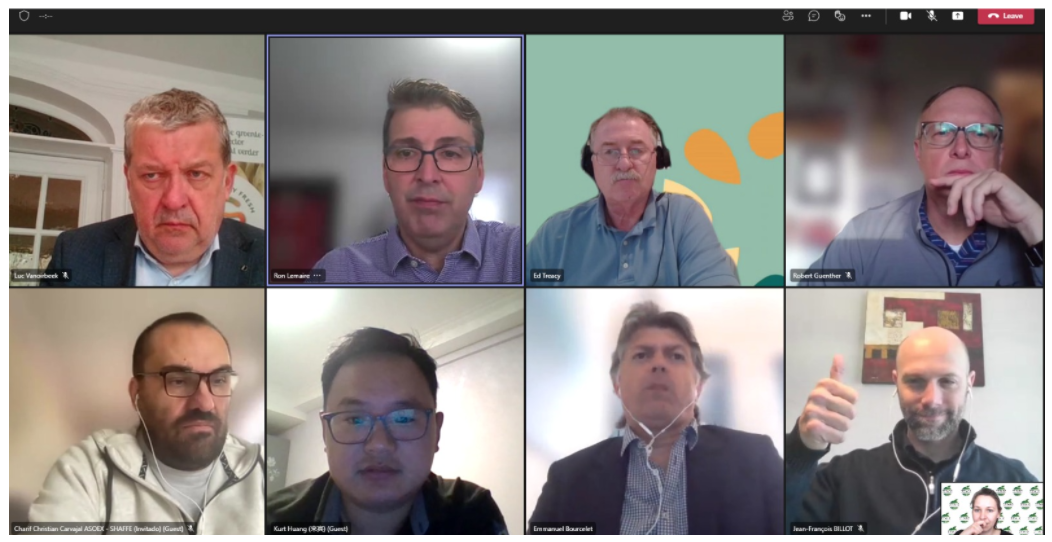
Freshfel Europe continues to work with Global Coalition of Fresh Produce in voicing cost hikes in supply chain debate for fresh produce industry
Freshfel Europe participated in another working group meeting of the Global Coalition of Fresh Produce on 16 March 2022. The Coalition was initiated by Freshfel, SHAFFE, IFPA, CPMA, COLEACP, Copa Cogeca, Afruibana and the CFNA to 1) exchange on the impact of the global cost hikes with different effects for different regions, and 2) discuss potential activities to secure that fruit and vegetables are part of the global debate regarding solution finding. The working group has been finalising a declaration which will be launched in early April with outreach to multilateral stakeholders, to centre the attention of regulators on the positive benefits of fresh produce for public health and global nutrition when seeking solutions to the current challenges. The Coalition has been further securing a meeting with FAO Chief Economist Massimo Torreno, to initiate a first dialogue at multilateral level.
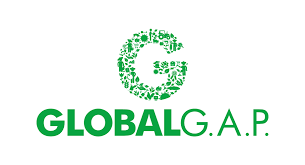
Freshfel Europe coordinates feedback on technical bottlenecks in GLOBALG.A.P. Chain of Custody certification
Looking towards the approaching introduction of the GOBALG.A.P. Chain of Custody, Freshfel Europe has coordinated a collective information gathering and exchange with its members to identify the technical bottlenecks connected to the introduction of the new standard. The new standard, which aims to improve the traceability of GLOBALG.A.P. certified products along the chain, brings a new complexity, which burdens the administration along the chain. Freshfel Europe suggested a range of points for simplification and improvement, including 1) simplification of documentation, 2) the inclusion of all parts of the supply chain including retail, 3) a prolonged transition period to allow traders, brokers and packers to adjust their operations to the new requirements. The suggestions will be discussed within the GLOBALG.A.P. Technical Committee for the Chain of Custody standard.

Freshfel Europe organises timely exchange on implementation of the organic reform & new plans to improve organic controls
Freshfel Europe organised in mid-February an exchange with European Commission officials of DG AGRI’s organic unit, to examine together the key novelties regarding the newly implemented and delegated acts in the area of trade and controls affecting the handling of the Certificate of Inspection on Organic (COI) as well as the requirements for the place of controls for fresh organic imports. Freshfel Europe took the occasion to analyse together with the European Commission the draft proposals on increased control requirements for certain product-origin combinations. The sector underlined that the current system does not allow enough transparency with regard to arising risks as well as missing methodology for the assessment of those risks in the broader context. It was further highlighted that similar to the trade with conventional products, a common transparent monitoring system will be needed, to allow the sector to be self-responsible if non-compliances are detected.
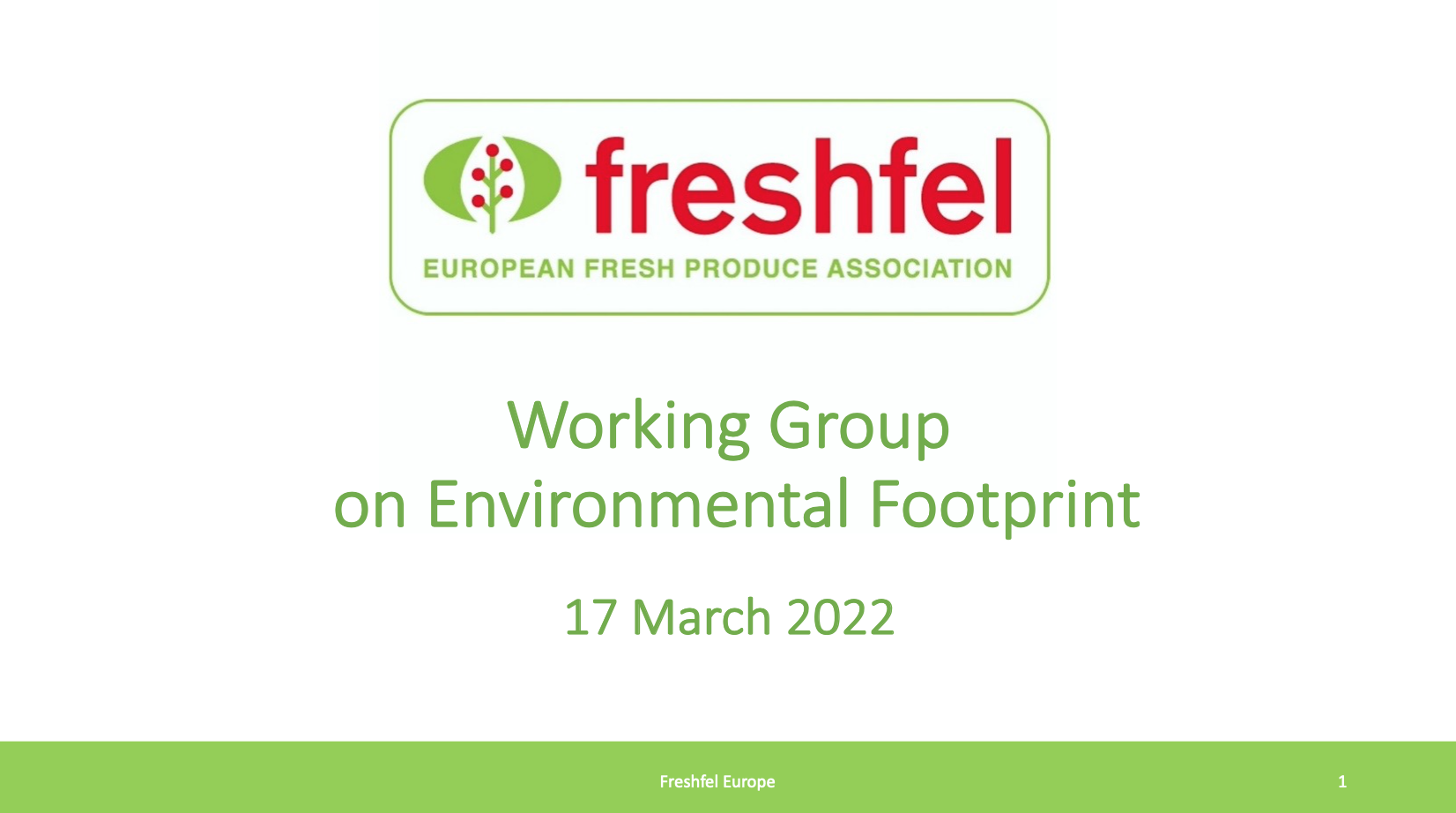
Freshfel Europe Working Group on Environmental Footprint explores upcoming legislation
Freshfel Europe held its first Environmental Footprint Working Group meeting for 2022 on the 17 March under the Chair of Freshfel Europe Director for Sustainability and Health Nicola Pisano. The Working Group gathers Freshfel Europe members who have an interest in environmental footprint and LCA on a regular basis to discuss pertinent sector issues, legislative developments and share new innovations and insights. The March Working Group meeting featured a guest presentation from Profel Director General Susanne Meyer on Profel’s sustainability work and in particular their interest in LCA and PEFCR developments. The Working Group was also debriefed on the recent European Commission Recommendation on the use of PEF Methodology as well as upcoming European Commission public consultations involving environmental footprint discussions, including the Farm to Fork Strategy proposal for a sustainable food labelling framework to empower consumers to make sustainable food choices and EU certification of carbon removals.
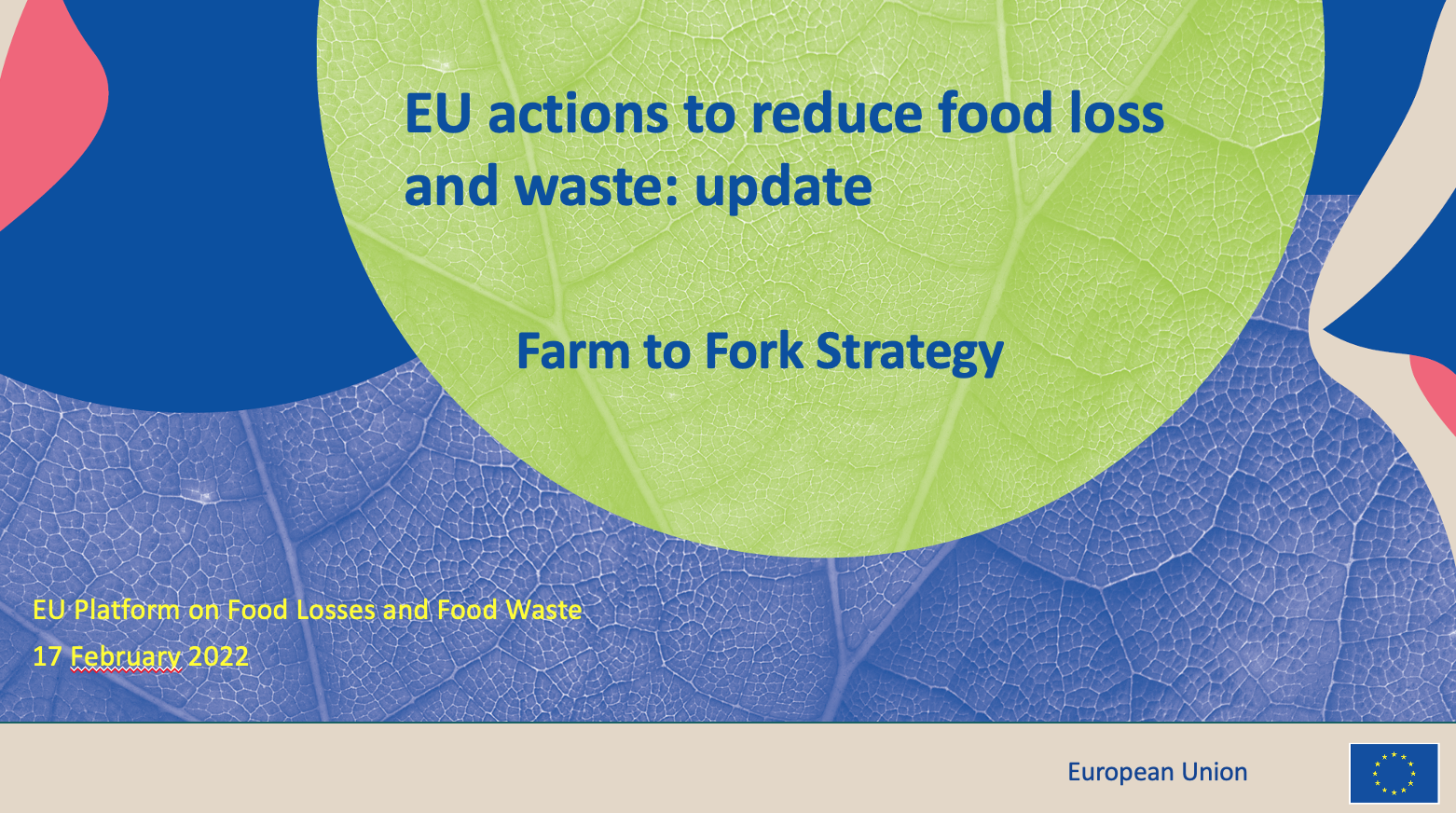
Freshfel Europe attends first meeting of new mandate of EU Platform on Food Losses and Food Waste
On the 17 February 2022 Freshfel Europe Director for Sustainability and Health Nicola Pisano attended the EU Platform on Food Losses and Food Waste. The meeting marked the first of the Platform’s second mandate which will run from 2022 until 2026. The purpose of the Platform’s second mandate is to work towards developing EU level targets for food waste reduction as specified under the Farm to Fork Strategy. The proposal for EU level targets is foreseen to be completed by 2023 and will be part of the revision of the Waste Framework Directive. Other areas for action under the Platform currently include revision of EU rules for date marking, investigation of food losses at production stage, further integration of food loss and waste prevention in all relevant EU policies and mobilization of key actors across the EU. Freshfel Europe will be participating in all Platform discussions and actions where the fresh produce sector can contribute to preventing food loss and waste throughout the fresh fruit and vegetable supply chain.

Freshfel Europe responds to European Commission consultation on alternative plastics
In March Freshfel Europe responded to the European Commission web-based public consultation on a ‘Policy framework on biobased, biodegradable and compostable plastics’. The European Commission conducted this consultation in preparation for an EU-wide policy framework applying to biobased, biodegradable and compostable plastics as proposed under the Circular Economy Action Plan. The objective of the new framework is to promote the use of bio-based, biodegradable and compostable plastics that lead to genuine environmental benefits to contribute to a sustainable plastics economy. Freshfel Europe is supportive of this new framework, especially in light of the increasing use of alternative plastics in the fresh produce sector, which have steadily replaced conventional plastics, where the upholding of the functionality of the materials is essential. Freshfel Europe has been in close contact with the European Commission DG ENVI services for some years regarding the use of plastics across the supply chain since the early discussions on the now adopted Single-Use Plastics Directive. Most recently this has concerned national and regional legislation in Europe on industrial and home compostable fresh produce labels.
